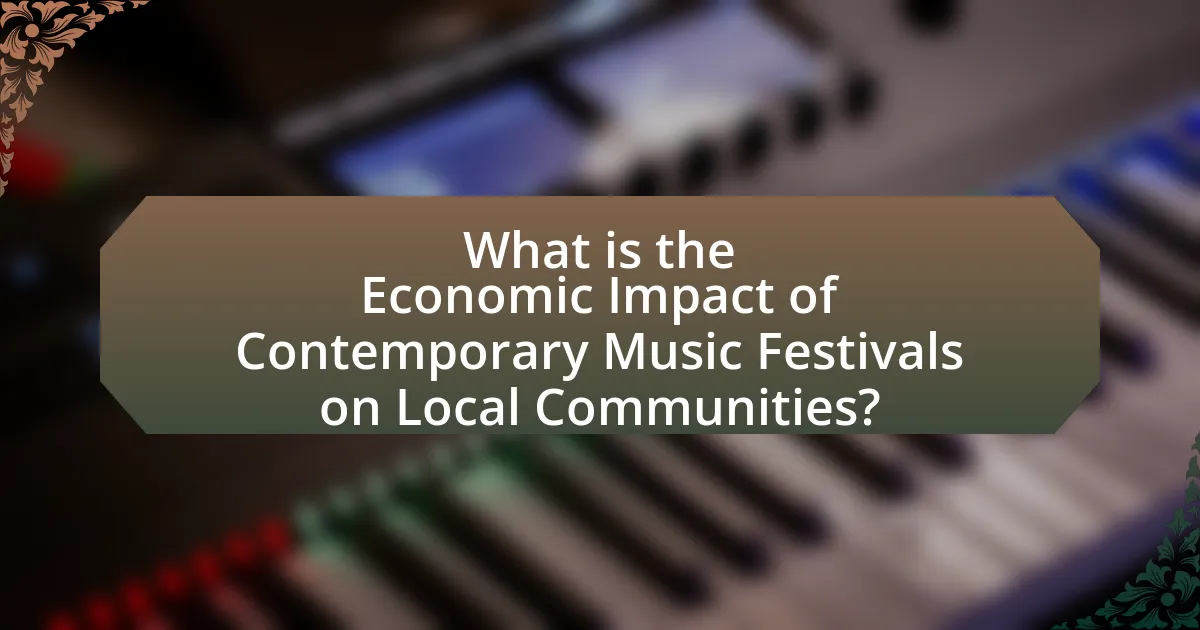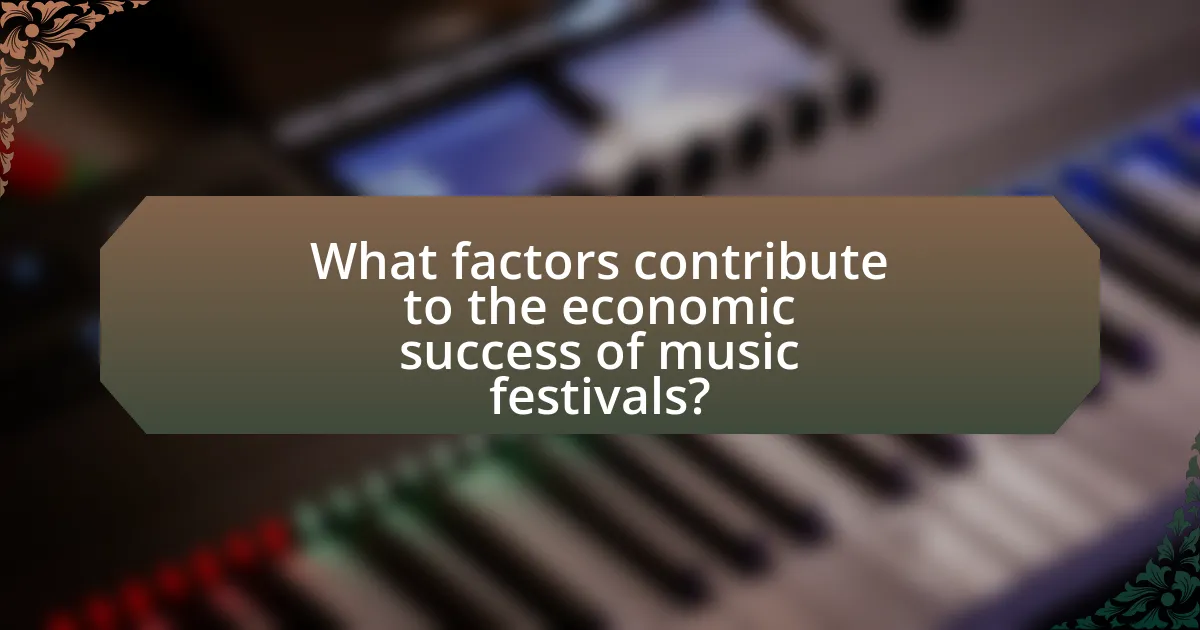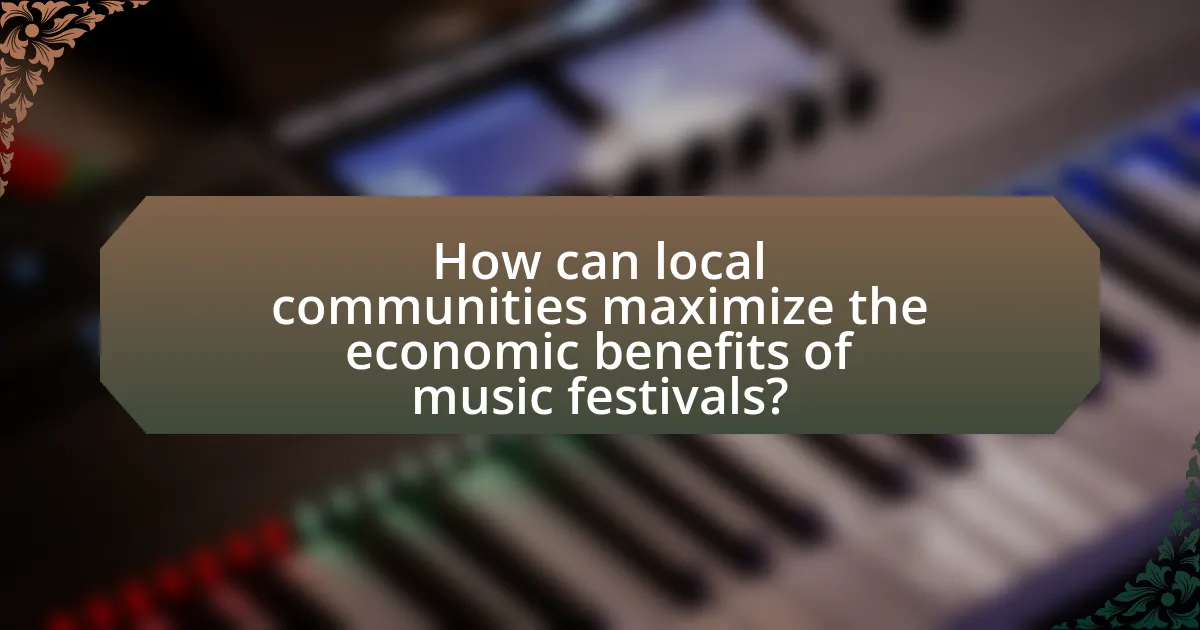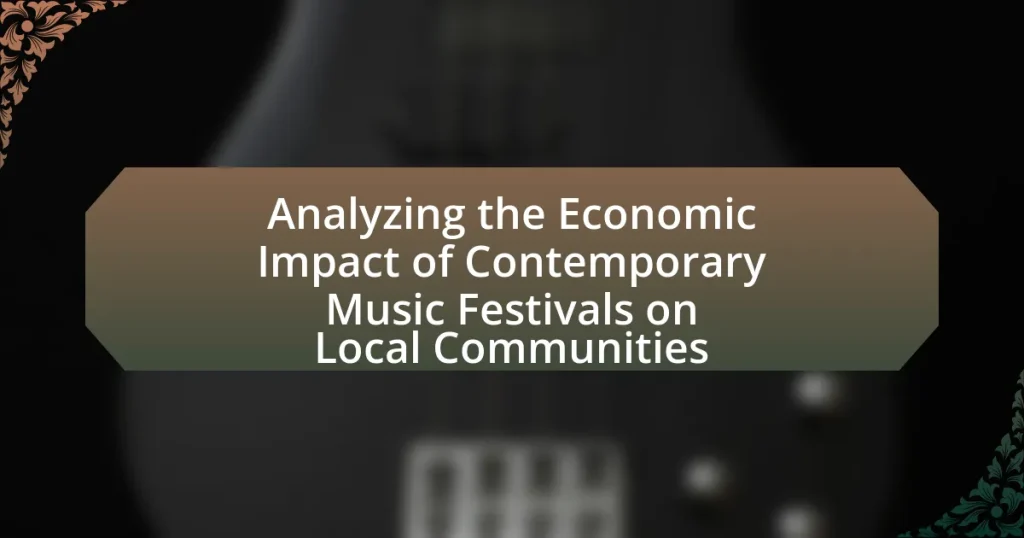The article analyzes the economic impact of contemporary music festivals on local communities, highlighting their role in boosting local economies through increased tourism, job creation, and local business engagement. It presents data from studies, such as the National Endowment for the Arts, demonstrating significant financial contributions from festivals like Coachella, which generated approximately $403 million in 2019. The article also discusses the direct and indirect economic benefits, challenges faced by communities, and strategies for maximizing the positive effects of music festivals, emphasizing the importance of local business involvement and community feedback in enhancing overall success.

What is the Economic Impact of Contemporary Music Festivals on Local Communities?
Contemporary music festivals significantly boost local economies by generating revenue through tourism, hospitality, and local business engagement. For instance, a study by the National Endowment for the Arts found that music festivals can attract thousands of attendees, leading to increased spending on accommodations, food, and entertainment. In 2019, the Coachella Valley Music and Arts Festival contributed approximately $403 million to the local economy, demonstrating the substantial financial impact these events can have on surrounding communities. Additionally, local businesses often experience a surge in sales during festival weekends, further solidifying the economic benefits of hosting such events.
How do contemporary music festivals influence local economies?
Contemporary music festivals significantly influence local economies by generating substantial revenue through tourism, job creation, and local business support. For instance, a study by the National Endowment for the Arts found that music festivals can attract tens of thousands of attendees, leading to increased spending on accommodations, food, and entertainment. In 2019, the Coachella Valley Music and Arts Festival contributed approximately $403 million to the local economy, demonstrating the financial impact such events can have on surrounding communities. Additionally, festivals often create temporary and permanent jobs, further stimulating economic growth.
What are the direct financial benefits of hosting a music festival?
Hosting a music festival generates direct financial benefits such as increased revenue from ticket sales, local business patronage, and tourism. For instance, a study by the National Endowment for the Arts found that music festivals can attract thousands of attendees, leading to significant spending on accommodations, food, and merchandise. In 2019, the Coachella Valley Music and Arts Festival reported an economic impact of over $700 million on the local economy, demonstrating how festivals can boost local businesses and create jobs. Additionally, festivals often lead to increased tax revenues for local governments, further enhancing their financial benefits to the community.
How do music festivals affect local employment rates?
Music festivals positively affect local employment rates by creating temporary and permanent job opportunities in various sectors. For instance, during events, local businesses such as hotels, restaurants, and retail stores often hire additional staff to accommodate the influx of attendees, leading to a measurable increase in employment. A study by the National Endowment for the Arts found that music festivals can generate significant economic activity, with some festivals contributing to a 20% increase in local employment during the event period. Additionally, the long-term presence of festivals can encourage year-round job creation in tourism and hospitality sectors, further enhancing local employment stability.
What are the indirect economic effects of music festivals?
Music festivals generate significant indirect economic effects on local communities, primarily through increased tourism, job creation, and enhanced local business revenues. For instance, festivals attract visitors who spend money on accommodations, food, and entertainment, which stimulates the local economy. A study by the National Endowment for the Arts found that events like music festivals can lead to a 20% increase in local hotel occupancy rates during the festival period. Additionally, local businesses, such as restaurants and shops, often see a surge in sales, contributing to overall economic growth. Furthermore, the festivals create temporary jobs in areas such as event management, security, and hospitality, which can have lasting benefits for the local workforce.
How do music festivals contribute to local tourism?
Music festivals significantly contribute to local tourism by attracting large numbers of visitors, which boosts the local economy. For instance, a study by the National Endowment for the Arts found that music festivals can generate millions in revenue for host cities through ticket sales, accommodation, food, and merchandise purchases. Additionally, festivals often promote local culture and heritage, encouraging attendees to explore the area beyond the event itself, further enhancing tourism. In 2019, the Coachella Valley Music and Arts Festival attracted over 250,000 attendees, resulting in an estimated economic impact of $403 million for the local economy. This demonstrates how music festivals serve as a catalyst for increased tourism and economic growth in local communities.
What role do local businesses play in the success of music festivals?
Local businesses are crucial to the success of music festivals as they provide essential services, products, and support that enhance the overall festival experience. These businesses, including restaurants, hotels, and retailers, contribute to the local economy by attracting festival-goers who spend money on food, lodging, and merchandise. For instance, a study by the National Endowment for the Arts found that music festivals can generate significant economic activity, with local businesses often reporting increased sales during festival weekends. This symbiotic relationship not only boosts the financial viability of the festival but also fosters community engagement and promotes local culture, making local businesses integral to the festival’s success.

What factors contribute to the economic success of music festivals?
The economic success of music festivals is primarily driven by factors such as ticket sales, sponsorships, and local tourism. Ticket sales generate direct revenue, with major festivals often selling hundreds of thousands of tickets, contributing significantly to their financial viability. Sponsorships from brands seeking exposure to large audiences provide additional funding, enhancing the festival’s budget and marketing reach. Furthermore, music festivals attract tourists, which boosts local economies through spending on accommodations, food, and transportation. For instance, a study by the National Endowment for the Arts found that festivals can generate millions in local economic impact, demonstrating the interconnectedness of these factors in driving economic success.
How does festival size impact economic outcomes?
Festival size significantly impacts economic outcomes by influencing the volume of attendees and the associated spending in local communities. Larger festivals typically attract more visitors, leading to increased revenue for local businesses such as hotels, restaurants, and retail shops. For instance, a study by the National Endowment for the Arts found that large-scale festivals can generate millions in economic activity, with attendees spending an average of $100 per day on accommodations, food, and entertainment. Additionally, larger festivals often create more job opportunities and stimulate investment in infrastructure, further enhancing the economic benefits for the host community.
What is the relationship between attendance numbers and local spending?
Higher attendance numbers at contemporary music festivals correlate positively with increased local spending. This relationship is evidenced by studies showing that larger crowds lead to greater expenditures on accommodations, food, and entertainment within the community. For instance, a report by the National Endowment for the Arts indicates that festivals attracting over 10,000 attendees can generate upwards of $1 million in local economic impact, primarily through visitor spending. Thus, as attendance rises, so does the financial benefit to local businesses and the overall economy.
How do sponsorships and partnerships enhance economic benefits?
Sponsorships and partnerships enhance economic benefits by providing financial support and resources that stimulate local economies. For instance, when a music festival partners with local businesses, it increases revenue through ticket sales, merchandise, and food sales, which can lead to job creation and increased tax revenue for the community. A study by the National Endowment for the Arts found that arts-related events, including music festivals, can generate up to $27 in economic return for every $1 invested in sponsorships. This demonstrates that effective collaborations can significantly boost local economic activity and foster community development.
What are the challenges faced by local communities when hosting music festivals?
Local communities face several challenges when hosting music festivals, including noise pollution, traffic congestion, and resource allocation. Noise pollution can disrupt the daily lives of residents, leading to complaints and potential conflicts. Traffic congestion often results from increased visitor numbers, straining local infrastructure and causing delays for residents. Additionally, resource allocation becomes a challenge as communities must balance the needs of festival-goers with those of local residents, often requiring significant investment in public services such as sanitation, security, and emergency response. These challenges can impact community relations and the overall success of the festival.
How do logistical issues affect the economic impact of festivals?
Logistical issues significantly reduce the economic impact of festivals by causing inefficiencies that lead to decreased attendance and increased operational costs. For instance, inadequate transportation infrastructure can hinder access to the festival site, resulting in lower visitor numbers and, consequently, reduced revenue for local businesses. A study by the University of California found that festivals with well-planned logistics saw a 30% increase in attendance compared to those with logistical challenges. Additionally, poor management of resources, such as insufficient staffing or inadequate facilities, can lead to negative attendee experiences, further diminishing potential economic benefits.
What are the potential negative economic consequences of music festivals?
The potential negative economic consequences of music festivals include increased local costs, disruption of local businesses, and potential long-term financial burdens on communities. Local governments often incur significant expenses for infrastructure improvements, security, and emergency services to accommodate large crowds, which can strain public resources. Additionally, local businesses may experience disruptions due to road closures and increased competition from festival vendors, leading to a temporary decline in sales. Furthermore, if festivals do not generate sufficient revenue, they can leave communities with debts or financial obligations that persist long after the event concludes. For instance, a study by the University of California found that cities hosting large festivals often face increased public spending without a proportional increase in tax revenue, highlighting the financial risks involved.

How can local communities maximize the economic benefits of music festivals?
Local communities can maximize the economic benefits of music festivals by strategically planning and promoting the events to attract larger audiences and enhance local engagement. Effective marketing campaigns that highlight local culture and attractions can increase attendance, leading to higher revenue for local businesses. For instance, a study by the National Endowment for the Arts found that festivals can generate significant economic impact, with attendees spending an average of $100 per day on accommodations, food, and entertainment. Additionally, involving local vendors and artists in the festival can create a sense of ownership and community pride, further driving economic benefits. By leveraging partnerships with local businesses and utilizing social media for promotion, communities can ensure that music festivals contribute positively to their local economies.
What strategies can be implemented to enhance local engagement?
To enhance local engagement, music festivals can implement community-focused initiatives such as local artist showcases, partnerships with local businesses, and volunteer programs. Local artist showcases provide a platform for regional talent, fostering community pride and participation. Collaborating with local businesses can create mutually beneficial promotions, driving foot traffic and economic activity in the area. Additionally, establishing volunteer programs encourages community involvement, allowing residents to contribute to the festival’s success while building social connections. These strategies have been shown to increase local participation and investment in community events, as evidenced by studies indicating that festivals with strong local ties see higher attendance and support from residents.
How can communities involve local businesses in festival planning?
Communities can involve local businesses in festival planning by creating partnerships that leverage the resources and expertise of these businesses. Engaging local businesses can include inviting them to participate in planning meetings, offering sponsorship opportunities, and encouraging them to provide goods or services for the festival. For instance, a study by the National Endowment for the Arts highlights that local businesses often benefit from increased foot traffic and sales during festivals, which incentivizes their involvement. Additionally, businesses can contribute to marketing efforts, enhancing the festival’s visibility and reach within the community.
What role does community feedback play in festival success?
Community feedback is crucial for festival success as it directly influences planning, execution, and overall attendee satisfaction. Engaging with local residents allows festival organizers to tailor events to community preferences, ensuring higher participation rates and positive experiences. For instance, a study by the University of California found that festivals incorporating community input saw a 30% increase in attendance compared to those that did not. This feedback loop not only enhances the festival’s relevance but also fosters a sense of ownership among locals, leading to stronger community support and economic benefits for local businesses.
What best practices should communities follow when organizing music festivals?
Communities should prioritize thorough planning and stakeholder engagement when organizing music festivals. Effective planning involves establishing clear objectives, budgeting accurately, and securing necessary permits. Engaging stakeholders, including local businesses, residents, and law enforcement, fosters collaboration and addresses community concerns. Research indicates that festivals can generate significant economic benefits; for instance, a study by the National Endowment for the Arts found that arts festivals can boost local economies by attracting tourists and increasing spending in the area. Additionally, implementing sustainable practices, such as waste management and transportation planning, enhances the festival’s positive impact on the community.
How can effective marketing strategies boost festival attendance?
Effective marketing strategies can significantly boost festival attendance by enhancing visibility and engagement with target audiences. For instance, utilizing social media platforms allows festivals to reach a broader demographic, as 79% of the U.S. population uses social media, providing a direct channel for promotion and interaction. Additionally, targeted advertising can attract specific groups, increasing the likelihood of attendance; research indicates that personalized marketing can improve conversion rates by up to 10%. Furthermore, partnerships with local businesses and influencers can create a sense of community involvement, encouraging local attendance and support. These strategies collectively contribute to higher ticket sales and increased foot traffic, ultimately benefiting the local economy through enhanced festival attendance.
What are the key elements of successful festival management?
The key elements of successful festival management include effective planning, stakeholder engagement, risk management, and marketing strategies. Effective planning involves setting clear objectives, timelines, and budgets, which are essential for coordinating resources and activities. Stakeholder engagement ensures collaboration among local authorities, sponsors, vendors, and the community, fostering support and participation. Risk management identifies potential challenges, such as safety concerns or weather issues, and develops contingency plans to mitigate them. Marketing strategies, including social media promotion and targeted advertising, are crucial for attracting attendees and maximizing ticket sales. These elements collectively contribute to the overall success and sustainability of music festivals, as evidenced by studies showing that well-managed festivals can significantly boost local economies through increased tourism and spending.
What are the long-term economic benefits of music festivals for local communities?
Music festivals provide significant long-term economic benefits for local communities by boosting tourism, creating jobs, and stimulating local businesses. These events attract thousands of visitors, which increases spending in hotels, restaurants, and shops. For instance, a study by the National Endowment for the Arts found that festivals can generate millions in revenue for host cities, with the 2019 Coachella Valley Music and Arts Festival contributing approximately $403 million to the local economy. Additionally, music festivals often lead to the creation of seasonal and permanent jobs in various sectors, including hospitality and event management. This job creation can have a lasting impact on community employment rates and economic stability. Furthermore, the increased visibility and reputation of a community as a cultural destination can lead to sustained tourism growth, enhancing the local economy over time.
How can music festivals contribute to community identity and cohesion?
Music festivals can significantly enhance community identity and cohesion by fostering a shared cultural experience among residents. These events bring together diverse groups, allowing individuals to connect through music, art, and shared values, which strengthens social bonds. For instance, a study by the National Endowment for the Arts found that community events, including music festivals, increase local engagement and participation, leading to a stronger sense of belonging. Additionally, music festivals often celebrate local culture and heritage, reinforcing community pride and identity. This collective participation not only promotes social interaction but also encourages collaboration among local businesses and organizations, further solidifying community ties.
What lessons can be learned from successful music festivals in other regions?
Successful music festivals in other regions demonstrate the importance of community engagement and strategic planning for maximizing economic impact. For instance, festivals like Coachella in California and Glastonbury in the UK have shown that involving local businesses and residents in the planning process enhances support and participation, leading to increased tourism and local spending. According to a study by the University of California, Riverside, Coachella generates approximately $403 million in economic impact annually, highlighting how effective collaboration can yield substantial financial benefits for local communities. Additionally, successful festivals often prioritize sustainability and accessibility, which not only attract a diverse audience but also foster long-term community goodwill and environmental responsibility.
